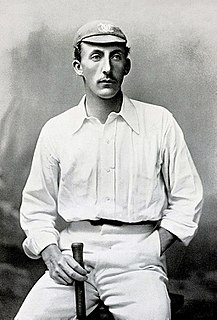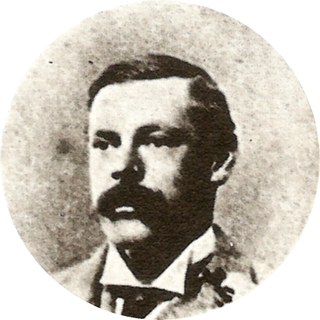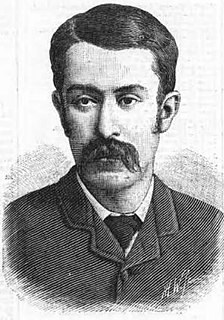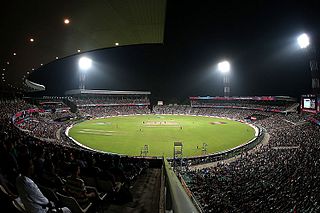
Edward William Bastard was an English first-class cricketer who played for Oxford University and Somerset. Bastard was a slow left-arm orthodox bowler, described in his Wisden obituary as Somerset's best bowler during his time with the club. Bastard was also part of the Oxford team often said to be the university's best ever.

Lionel Charles Hamilton Palairet was an English amateur cricketer who played for Somerset and Oxford University. A graceful right-handed batsman, he was selected to play Test cricket for England twice in 1902. Contemporaries judged Palairet to have one of the most attractive batting styles of the period. His obituary in The Times described him as "the most beautiful batsman of all time". An unwillingness to tour during the English winter limited Palairet's Test appearances; contemporaries believed he deserved more Test caps.

Herbert Tremenheere "Herbie" Hewett was an English amateur first-class cricketer who played for Somerset, captaining the county from 1889 to 1893, as well as Oxford University and the Marylebone Cricket Club. A battling left-handed opening batsman, Hewett could post a large score in a short time against even the best bowlers. Capable of hitting the ball powerfully, he combined an excellent eye with an unorthodox style to be regarded at his peak as one of England's finest batsmen.

William Nichols "Bill" Roe was an English first-class cricketer who played for Somerset County Cricket Club and Cambridge University in the late 19th century. A right-handed batsman who could play aggressively, but with a sound defensive method, Roe was considered one of Somerset's leading batsmen of the era. He played without merit for Cambridge, and only achieved his Blue during his final year at the university.
Peter Bernard Wight was a Guyanese first-class cricketer who played for Somerset, Canterbury and British Guiana. Wight was a prolific run scorer at the top of the order, scoring 16,965 runs during his thirteen years at Somerset; and at the time of his death only Harold Gimblett had made more runs for the county. After playing, he became an umpire in English first-class cricket, standing in matches from 1966 to 1995.
William Norris Antliff was an English cricketer who played first-class cricket for Derbyshire in 1880.
Herbert Francis Thomas "Bertie" Buse (1910–1992) was a cricketer who played 304 first-class matches for Somerset before and after the Second World War.
Graham Atkinson was a cricketer who played first-class and List A cricket for Somerset and Lancashire. He was born in Lofthouse, Wakefield, Yorkshire, England.

Edward ("Ted") Sainsbury was an English cricketer who represented, and captained, Somerset County Cricket Club in the late 19th century. During a 10-year first-class cricket career, he also represented Gloucestershire and the Marylebone Cricket Club (MCC).
Major Alexander Gould Barrett was an Englishman who was a member of the landed gentry. He served in the West Somerset Yeomanry, and was a keen amateur cricketer who played one first-class cricket match for Somerset in 1896, and was president of the club in the early 1930s.
Frederick George Kenneth "Ken" Day played first-class cricket for Somerset in seven matches in 1950 and 1956.

Joseph Charles "Jos" Buttler is an English professional cricketer who is currently vice-captain of the English cricket team. He plays for Lancashire in English county cricket. He is a right-handed batsman who also plays as a wicket-keeper. He initially played for Somerset and has played Twenty20 franchise cricket in the Australian Big Bash League, the Indian Premier League and the Bangladesh Premier League.

Arthur Edward Newton was an English cricketer who played for Somerset in the county's pre-first-class days and then for more than 20 years after the team entered the County Championship in 1891. He also played for Oxford University and for a variety of amateur teams. As a cricketer, he was known as "A. E.", not by his forename.

John Bonamy Challen was a Welsh amateur sportsman who played first-class cricket and association football during the late 19th century. He played football for Corinthian F.C., and was selected to play for Wales four times between 1887 and 1890. As a cricketer, he made over 50 first-class appearances, all for Somerset County Cricket Club. His availability in both sports was limited by his career in education; he was headmaster at a number of schools across southern England.

Alfred Edward Bailey was a professional cricketer who played first-class cricket for Somerset from 1900 to 1911 as a lower-order right-handed batsman and a slow left-arm spin bowler.
Edmund Paris Paul played first-class cricket for Somerset in four matches between 1907 and 1910. He was born and died at Taunton, Somerset.
Harry "Joe" Griffin played first-class county cricket for Somerset in 1898 and 1899. As a slow left-arm bowler, he was employed as a professional by Todmorden Cricket Club in the Lancashire League before being recruited by Somerset. He played four matches for the county, but his bowling action was questioned, with suggestions that he was guilty of throwing. He continued to play club cricket for Street for many years after.
William Morton Massey was an English cricketer who played first-class cricket for Somerset in 1882 and for Lancashire in 1883. He was born in Manchester and died in New York City, United States.
Harry Edmund Winter was an English cricketer who played first-class cricket for Somerset County Cricket Club in 1884.
Somerset County Cricket Club made their debut in first-class cricket in the 1882 English cricket season. They were captained by Stephen Newton, and played eight first-class matches, five against county opposition, two against the Marylebone Cricket Club and one against the touring Australian team. They only won one of the eight contests, that against Hampshire at Taunton. Of the other matches, one was drawn and the other six were all losses for Somerset. Wisden Cricketers' Almanack described the season as "disastrous", but the publication qualified this statement with mild optimism for 1883.













